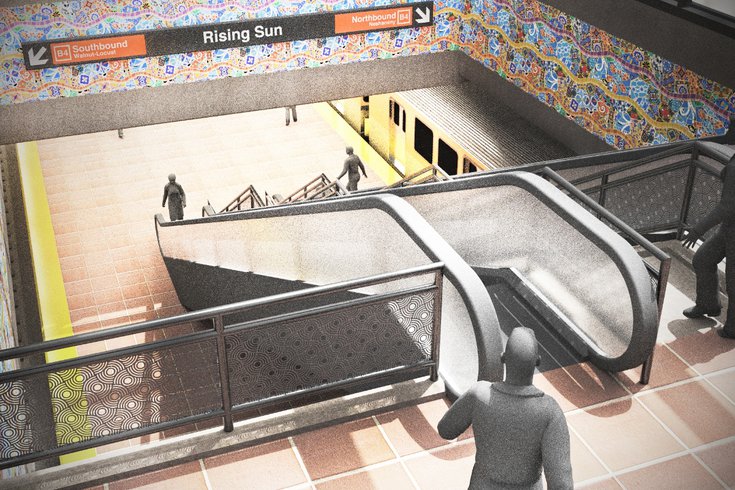
June 14, 2023
 Provided Image/Jay Arzu
Provided Image/Jay Arzu
The rendering above shows a SEPTA subway station for a proposed extension in Northeast Philadelphia. City Council is expected to hold hearings on the topic in response to last weekend's highway collapse on I-95.
Philadelphia City Council is expected to hold hearings about extending SEPTA's subway system to the Northeast section of the city. A resolution to do so was introduced Wednesday in the aftermath of the tanker-truck fire that caused a portion of I-95 to collapse in Tacony on Sunday.
Councilmember Mike Driscoll, whose Sixth District covers parts of Northeast Philly, was joined by 12 cosponsors who agreed it's time to discuss the subject. Over the last year, advocates for extending the city's subway system along Roosevelt Boulevard have held town halls and met with local leaders to build momentum for the project, which has periodically resurfaced in public debate over the last century.
"The incident (on I-95) sent countless residents scrambling with limited viable alternative options to get from the Northeast to Center City," Driscoll said. "We need to reexamine the proposed Roosevelt Boulevard extension from every angle and leave no stone unturned to find a viable transportation alternative."
Historically, the greatest barrier to extending the subway to the Northeast has been the massive cost the project would entail. Estimates suggest it would take between $2.5-$3.5 billion to construct the full proposed extension, which would include nine new stations along a 15-mile route from North Philadelphia to Neshaminy. Each station is projected to cost between $633-$794 million.
The proposed subway map would connect the Broad Street Line at Erie Avenue. The Market-Frankford Line would be connected around the Bustleton neighborhood and the new, extended line would end to the north in Neshaminy.
Northeast Philly subway advocate Jay Arzu, a University of Pennsylvania Ph.D. candidate who has been active in organizing a coalition for the subway extension, called the crash on I-95 a tragic wake-up call.
"We have to recognize our weaknesses," Arzu said Sunday during a phone interview. "We need more resiliency. If we had alternatives like a subway on Roosevelt Boulevard, there would be a way for people to divert themselves without having to necessarily drive on Roosevelt Boulevard. We have to be able to bounce back from this with some answers, and we believe that taking a harder look at the subway is one of the many things we need to do."
Driscoll's resolution calls for City Council's Committee on Transportation and Public Utilities to hold hearings in the near future, although dates have not yet been determined. Arzu said October had been a timeline discussed with Driscoll before the I-95 collapse, but now he hopes to see the hearings moved up.
Driscoll said the hearings will go beyond the response to the highway collapse. He wants to focus on strategies that will change the way Northeast Philly's 500,000 residents connect with the rest of the city and address the traffic safety issues that have long plagued Roosevelt Boulevard.
"Removing thousands of cars from the roads would improve driver and pedestrian safety and facilitate a more sustainable, less car-dependent future," Driscoll said.